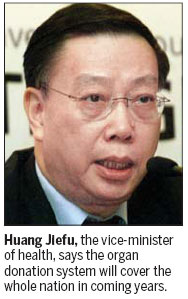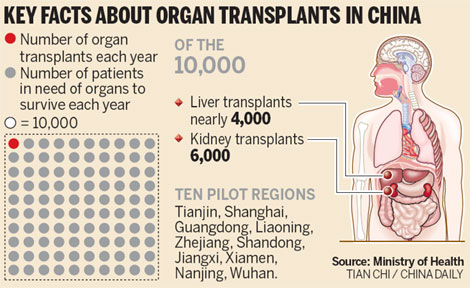|
Beijing - Chinese donors can now pledge their organs for use in life-saving transplants in parts of the country where nearly 99 out of 100 patients die because of a shortage in organ donations, Vice-Health Minister Huang Jiefu said.
The country's first posthumous organ donation system, jointly launched in March by the Red Cross Society and the Ministry of Health in 10 pilot regions including Tianjin, Wuhan and Shenzhen cities, is now ready to serve applicants, Huang said.
The system will be expanded nationwide in the coming years, Huang said.

Earlier, people could also donate their bodies after death but only for research purposes.
Under the new system, donors can go to local branches of the Red Cross Society of China to sign documents to donate organs. Death-row inmates and living donors are ineligible to pledge their organs.
"It will help save more dying patients who are waiting for a matching organ, lower the cost for the procedure and crack down on organ trafficking," Huang said in an interview with China Daily.
Almost 30 years after its first organ transplant, China still relies on executed prisoners as a major source of donated organs, mainly for liver and kidney transplants.
Although the organ transplant regulation issued in 2007 banned organ trading, a black market for organ transplants is thriving, experts have said.
"As China becomes rich and its people more well educated, a growing number of people would like to donate organs to help those in need of a transplant but find no way to do so," said Wang Ping, director of the relief and health department under the Red Cross Society.
He cited body donations as an example. To date, more than 80,000 people in the country have donated their bodies mainly for scientific studies and the number keeps rising.
To encourage donations under the new system, a special fund will also be established with support from the society, the government and organ recipients to help console poor families of donors, Wang said.
"But it is not organ trading," he said.
The Red Cross Society, one of the largest charities in the nation, is busy training staff to promote organ donation, a practice that has been considered to run contrary to the Chinese tradition that the body comes from parents and has to be kept intact even after death, Wang said.
Selected medical workers from hospitals' intensive care units are also included in the system to help identify potential willing donors and assist them, he said.
"It needs the support of all stakeholders including the hospital, general public and the transportation and public security departments," Wang said.
Each year, more than 100,000 people die in car accidents in China and many of them might be organ donors if informed beforehand, experts said.
For that, "we are considering, like many foreign countries such as the US, to print signed consent on the drivers' licenses of willing donors," Wang said.
Similarly, relevant organizations will be established under the system to facilitate donations in terms of procurement and distribution, he said.
China Daily

(China Daily 04/10/2010 page1)
|

